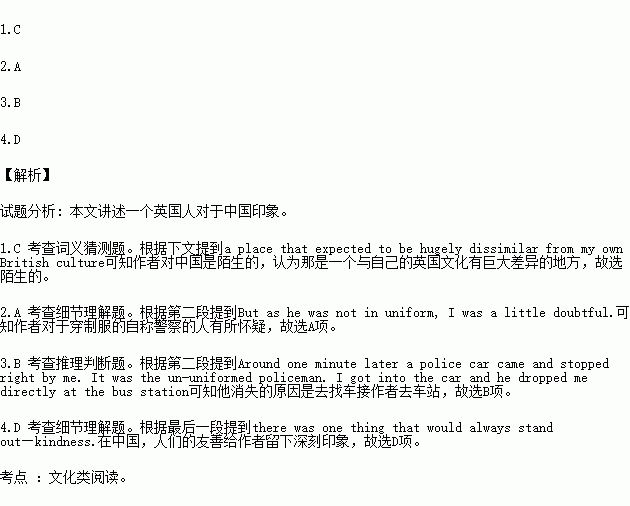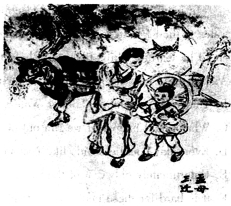题目内容
My decision to travel around China lay merely with my curiosity about the place. Before coming here, China seemed alien to me ----a place that expected to be hugely dissimilar from my own British culture.
After travelling from Beijing up to Xi'an, I wanted to challenge myself by choosing a smaller town----Xiahe in Gansu Province. I arrived in Lanzhou at around 5 am, but there were no buses to Xiahe. I managed to spot a policeman and attempted to explain my destination to him in simple English, praying that he would understand. I wasn't sure that he did but I just followed him anyway as I had no choice. He took me on a bus and I didn't know where I was going. Luckily, I met a student who explained to me in English that the policeman was taking me to another bus station where I could take a bus to Xiahe. During this conversation a third man said he was also a policeman and would help me buy tickets. But as he was not in uniform, I was a little doubtful. The uniformed policeman told me it was OK to go with the third man, so I got off the bus with the so-called policeman who at this point, disappeared and I was left in the middle of nowhere. I stood panicking. Around one minute later a police car came and stopped right by me. It was the un-uniformed policeman. I got into the car and he dropped me directly at the bus station, and helped me buy the ticket.
This is one of many experiences that I have had in China. I realized that however different this culture was, there was one thing that would always stand out—kindness. In the west we seem to lack the foundation of trust, yet in China it seems that there will always be someone to answer your questions and lead you the right way.
1.Which of the following is the closest in meaning to the underlined word "alien"?
A. Unfriendly. B. Familiar. C. Strange. D. Attractive.
2. What can we learn from the second paragraph?
A. The author doubted the so-called policeman.
B. The third man could speak English fluently.
C. The author followed a student to another bus station.
D. A police car took the un-uniformed policeman away.
3.Why did the un-uniformed policeman disappear after the author got off the bus?
A. He hurried to buy a ticket for the author.
B. He went to get a car to pick the author up.
C. The author didn't behave in a friendly way.
D. The author found a uniformed policeman to help him.
4.According to the text, what impressed the author deeply in China?
A. Beautiful scenes. B. Terrible transportation.
C. Troubles in small towns. D. People's kindness.


